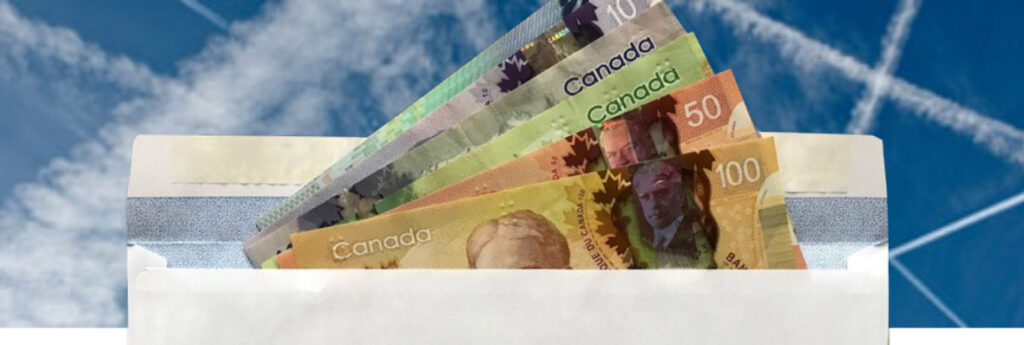In response to what Air Canada has termed “public disappointment,” the airline says its senior executives have chosen to return 2020 bonuses totalling millions of dollars. The payoffs had appeared particularly tone deaf during the pandemic as company employees faced layoffs and the company lobbied for a government bailout.
The bonuses also irked the federal government, which agreed in April to a $5.9 billion loan package for the airline that includes money to help refund passenger tickets, but also capped executive compensation at $1 million until 12 months after the loan is fully repaid. Finance Minister Chrystia Freeland called the bonuses “inappropriate.”
The government also paid $500 million for a six percent stake in the country’s biggest airline, which Freeland said was done to ensure taxpayers could benefit once Air Canada’s revenue rises when regular travel resumes.
Announced Sunday night, Air Canada said that its president and CEO, as well as executive vice-presidents, have volunteered to return their bonuses and share appreciation units. The statement does not include middle managers, whose bonuses made up more than $8 million of the $10-million bonus program, among those who are volunteering their bonuses.
Former president and CEO Calin Rovinescu, who retired in February 2021, says he will also donate his share to the Air Canada Foundation.
The airline last week disclosed its annual proxy circular to shareholders that gave the bonuses to people the investor document called instrumental in the airline’s survival over the past year as air travel plunged during the COVID-19 pandemic.
“Air Canada’s leadership team is completely focused on Air Canada’s recovery from the COVID-19 pandemic and preparations to welcome back furloughed colleagues and travelling customers as soon as possible,” Air Canada said.
The airline also stated that in 2020 it raised approximately $8 billion from private sources to help stabilize its finances during the pandemic and claimed that no taxpayer dollars or funds from the Canadian government sector support package were to be used to fund the bonus arrangements for its employees or executives.
In early 2020, senior executives and 3,200 management employees voluntarily agreed to total reductions of $11.5 million in their base salaries, subject to compensation through share appreciation units that might allow employees to recover some of the forgone salary if the share price rises higher in December 2022 than December 2020, the company says.
Freeland and Transport Minister Omar Alghabra said Canadians “are right to expect responsible corporate behaviour – particularly with respect to executive compensation – from companies receiving government financial support during the pandemic.”
“While this situation could have been entirely avoided by Air Canada, we acknowledge this step in the right direction by the top five executives to repay 2020 bonuses and share appreciation units they received,” they said in a joint statement Sunday night.
An unusual case
David Macdonald, a senior economist with the Canadian Centre for Policy Alternatives, says it’s unusual for public outcry to be successful in nudging C-Suite employees to return their bonuses, noting that the decision by Air Canada executives to voluntarily give back their bonuses is an incredibly rare case of an about-face on compensation from a company.
“In most cases it’s a day or two of bad press and the world goes on and CEO pay packages continue to increase,” Macdonald said in an interview Monday.
“It’s only in very extreme cases like this where CEOs and other C-Suite members are shamed into giving their money back.”
How it worked
Over the course of 2020, some of the airlines’ executives took pay cuts to their base salaries, including a $490,000 salary reduction for Rovinescu and a $245,000 reduction for CFO Michael Rousseau, according to the company’s most recent proxy circular.
“It just goes to show that it’s almost impossible for executives not to receive their bonuses even if those bonuses would’ve been wiped out in the normal course of operations due to COVID-19,” Macdonald said.
“The formulas are just changed after the fact so that everyone gets their bonuses in any event,” he said, referring to the calculations used to decide the amount of the bonus.
In Rovinescu’s case, he was awarded over $720,000 as a “pandemic mitigation bonus” in 2020, while Rousseau was given $420,000.
Aside from the specific case of Air Canada, Macdonald said bonus payouts are a part of a larger culture that favours executives even in the face of difficult financial times, like those experienced by the airline during the pandemic.
He doesn’t think this is a part of a larger trend, however, and instead is an exception that proves the rule.
“If you’re on the right side of some shift you had nothing to do with you get extraordinary bonuses, if you were on the wrong side of the shift, you just change the formulas after the fact and you still get extraordinary bonuses,” Macdonald said.

